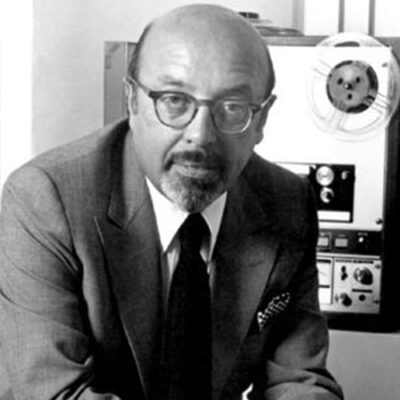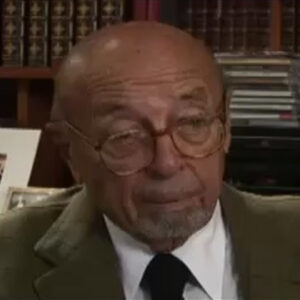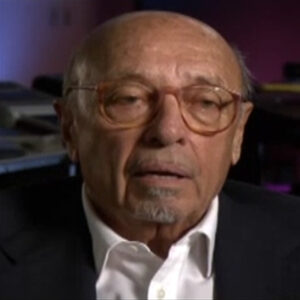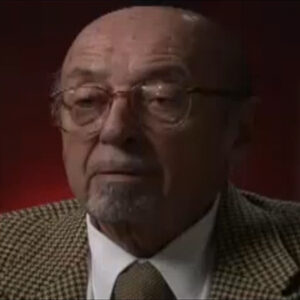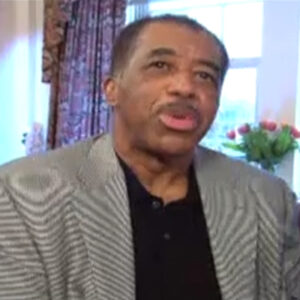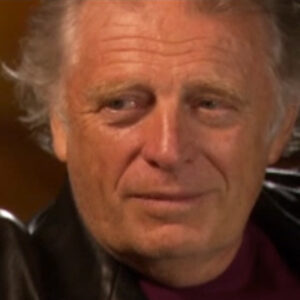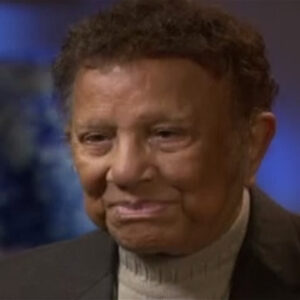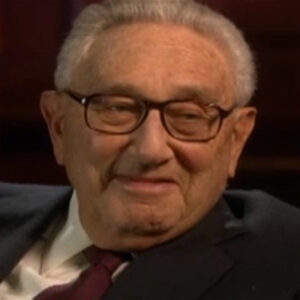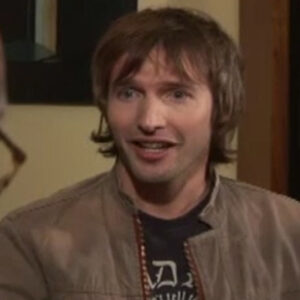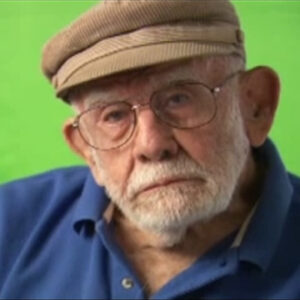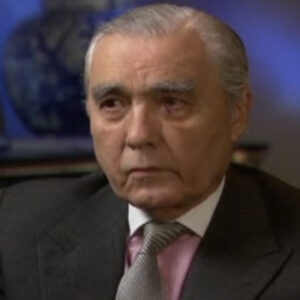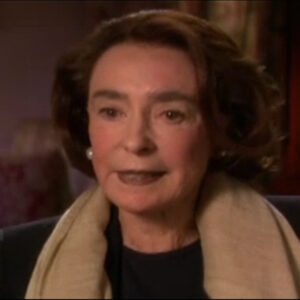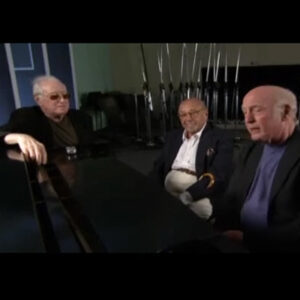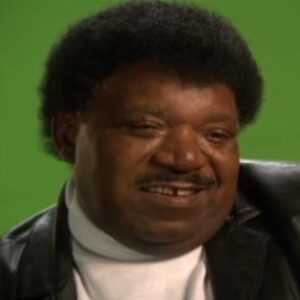M9 That I’ve often said this, I probably said this before and many of these interviews were done, uh. But that every country has beautiful music of its of its own.
F1 But with the advent of radio and the beginning of the 20th century.
M6 And photograph people first heard other people’s music and the only music that became an international music. For a reason which I cannot fathom, except that it’s my favorite music, but the only music that became the world’s music. As a black American music, black American music, not African music, not Russian music, not Swedish music, not Irish music, not Chinese music, black American music has become the music of the world continues to be and they aren’t the only popular international music.
M7 I mean, every country still have their own music. They all like their own. But then they have black American music and the white imitation of that black American music. And very often the white imitation becomes more popular for cosmetic reasons or whatever.
M1 But.
F1 It’s basically that that the music is essentially black American music, and because it is there for me in my mind. The hippest music, and I’m now speaking to the happiest man I’ve ever met in my life, Wynton Marsalis.
M21 Thank you for being here. It’s my pleasure to be here. Great pleasure. Thank you, ma’am. Yes.
M7 Uh, Winston is is the person who, more than anyone, is responsible for keeping alive jazz traditions, jazz traditions. And above. Not only the music of. Jelly Roll Morton, King Oliver, Lewis Armstrong and Duke Ellington, both jazz traditions involve the music of. All sorts of groups have found that the music of Coleman Hawkins, the music of Django Reinhart, the music of Pee wee Russell, the music of Benny Goodman and Tommy Dorsey and Count Basie and Lester Young and all of Lester Young followers. But all the bebop era, which to me. At my age, I think it would be about barer as a new music compared to the traditional music. However, almost everybody who was involved and the creation of the bebop era has now has died, so. It’s a new music, which is already an old music, but it’s still a music that young people play. A derivation of right, but Winton has kept all those traditions alive.
M37 You can not many places you can go to and have an orchestra play a Jimmy Lansford. Jimmy Lunsford was one of the greatest bands of all time, uh. You will find all of that, the jazz at Lincoln Center, thanks to Mr. Marsalis.
M7 What can I say to him? Terrible, I could go on talking just about you, man.
F15 I was a little curious to talk a little bit about, um, the two of you coming together. And I know many other people involved, but for me personally, it’s making it.
M37 Well, about jazz at Lincoln Center was formed by not by me, I joined it later. It was started by by other people, but basically it was all started around Wynton because it was Renton’s concept to not let the traditional music of his hometown, the New Orleans music, die. Nor do you want to see the music of Duke Ellington, who I think is one of his favorite composers and whose orchestra was the first really great orchestra I ever heard as a child. And I was just. I was just left breathless by the incredible power and diversity of talent within that orchestra. And it was it was great and.
F1 And my friends here keeps it going.
F15 We to come over here.
M2 So we’re going to get out. We’re going to get our thing in a minute.
M25 Sorry, I can’t keep on going. I don’t know. I’m I’m getting there, which I got you.
F8 I’m curious to know when you first have experience with lab records, what your as a kid growing up, what you do about the.
M14 Well, I’m sure you guys. All right, I’ll talk to him. OK, well, instead, I’ll just well address what I may it already so that what you can just kind of. Yeah.
M20 Thank you. Oh.
M24 First, it is interesting the perspective that you have, you know, coming from Turkey and having a history teacher, that you came in and you experienced kind of what American culture was like. And in the time that you came it with so many great musicians and they were playing so well over the years, it’s not like that now. It’s a different culture that we’re in now is always interesting for me that the type of impact that that you had and your brother had, that just I think about a part of what happens in America.
M21 A lot of times the two guys can come from Turkey and start kind of the record business just to see if they can pay for school or just to see.
M30 And then all of a sudden, because you have a car, you use your own sense of what something is in your own. You don’t you go your own way. You say, hey, I like this kind of music. Somebody else out here is like me.
M24 And are you able to see things about American culture, about our society, how it was that maybe it was not as apparent to us even at that time, especially in terms of a racial demarcation of music, has always been very interesting to me. The whole kind of race, delineation of music.
M20 Mainly because.
M30 As you know, in America, we have such a tradition of of racism and of ignorance, but in actuality for musicians it was not the same because many times the black musicians got training from white musicians. Many times they were playing music. They might have been written by white musicians. They what they liked, like Louis Armstrong, like Caruso, and even not even just outside of racial lines. People like somebody like Bessie Smith, Mahalia Jackson, who was the most religious of all singers. Holy is she like Bessie Smith and those low down times people go across there, whatever those lines are that we have when they practiced for the practice of the all, because that’s what I’m saying. Like Lester Young love Frankie Trombetta.
M24 However, when it’s presented to the public, then it has to be there has to be some type of racial delineation or how somebody looks. And I feel like it didn’t start to happen, really. I mean, it was always a part of America because we were so segregated, especially because music has a huge sexual component in an early age.
M30 You don’t want to have that, you know, for the way to say, oh, that’s all we can, you know. But in terms of the musicians in the music itself, the music is not so much about or is not so much about the racial identity of people as it’s about the cultural identity of people. That’s why Southern American music, whether is white or black music, has a lot in common, like a real country fiddler might be white Anglo American music all alone don’t de de de de de de de de de novo you’ll be sounding like.
M15 Is a brother from down the street.
M11 But as the music progressed, just because so many people around is not the intellectual energy around, it was about exploiting something that was considered to be more earthy and more this more that it is big, huge thing about black and white, which was what our culture.
M3 That’s what that’s what faced me when I came to America as I was 12 years old. And but I was a jazz fan. But what did you think when you experience I was a jazz fan and. And my parents were upset that they’re going so far away from their home, which turkey I mean, it was once they were in London and Paris, you go, you know, it’s easy to go back to Turkey, but going to America in those days where no planes. So you have to take a boat and you know, it’s a big deal. I was delighted to go back. I was delighted because I was going to the home to the real home of jazz. I was a jazz fan. And what we had were a couple of records where Django Reinhardt playing with Coleman Hawkins and Benny Carter that really killed us. Right. I heard the Duke Ellington band live and Cab Calloway. And that killed me because on the records, you didn’t hear the drums and the, you know, the bass that went the way they recorded in those days. So when you heard that live man, it was like, wow, you know what?
M4 Power and. I went to Washington, I came to America. And I thought I was going to hear.
M5 Janice and I was not see cowboys and Indians and Hollywood stars en masse, and they sent me to a very strict school. And the next thing I know, man, there was no jazz, nothing. No no cops and robbers. No, no cowboys and not but certainly.
M4 And. When I tried to buy records by Duke Ellington. A record by. Another by Fats Waller.
M3 There is the downtown store said we don’t carry those, so Mr. Timmons, I never forget, she told me there was a saleslady took me. I said, you go down 790 said there’s there’s some record shops down there. You’ll find those. Right. So I know you found those record shops. But I found the Howard Theatre, which was the Washington equivalent of the Apollo, but every week as one week was Chick Webb, the next week was Jimmy Lunsford, the next week with Andy Card, the next week with Afghans, the next week that one big band after another, all with, you know, all with Eugene Sedrick playing somebody, you know, just great, great musicians that these are not names which these are big names for me, you know. Right. And there were big and I remember I was 13 years old. I went backstage and I waited outside because, of course, they wouldn’t let me in backstage. I waited outside the door until I saw this girl singing with Chigwell band came out and I asked her for autograph. And she said to me, said, you know, she said, you’re the first person I ever asked me for my autograph.
M5 And I saw her autograph Ella Fitzgerald and gave me when I was a kid.
M4 Well, you know, but then.
M10 My brother came back from Europe and my older brother and he was starting to give lectures on jazz and in a bookshop that later was condemned as a communist front. But it was the only place where black and white intellectuals met in those days. And we became friends with members of the Howard faculty and. And we we decide we have jazz concerts and we bring musicians that from New York have all star concerts where and we broke the color line in the sense that we had the first concert, which had mixed bands and mixed audience. It was unbelievable to me that in the nation’s capital. And this country, which was the leader in human rights, the leader and democracy, that there should be what existed. Total segregation.
M11 Why do you think people were so accepting of that? Well, with that type of ideology, you’re not from America. Yeah, from another country you don’t really know about. The country you think is what you saw in the movies. Why do you think that the people in the country, the white people in the country, when you came, why do you think people were so accepting of that situation?
M12 Well, you know, want know something, everybody except the situation, it was like it was like a natural outgrowth of slavery. I mean, you know. Whatever people felt, nobody took it upon themselves to say, I’m going to do something bad because it was too big a problem, it has all these people who had just released. And became free and and had no education, no help, no, there was no no way of you know. I mean, it was and the situation was such that. Black people seem to accept that, you know, they didn’t like it, but. They didn’t know any way out of that of that, let me tell you why people I mean, friends of mine, when I say, hey, Jessica, you know, this is a terrible thing. And they say, oh, so you’re you don’t understand the American way. I mean, it was like I didn’t understand the.
M3 I was I was taking only time, I was taken to jail and my life was Anapolis, I was going to college, I was 17 years old. I went to hear a band in a black club in Annapolis, and they arrested me. When I came out and and took me, I said, But, Lord, I said, Jug, what did I break? He said, You broke the Jim Crow law. I said, Is that written down anywhere? He said, No. I’ve said everybody understands that.
M13 It says said, hey, look at my notes and I guess you’re a foreigner, that you don’t understand what our laws are. I said, I don’t consider that a law because it’s not written anywhere. And I see 10 years in jail.
M11 So but another thing I’m interested in, just from your perspective, because you came at that time in the history and you saw like the civil rights movement come in. So it’s been curious to me how you could have that type of condition. That existed all the time after slavery to the early 1970s, basically legislation was being passed and people were doing everything in the 1960s. Do you think that there’s been enough time has passed since that legislation, legislation that all those problems have gone away when you look at America right now?
M10 Well, you know, no, man. I mean, we’re not close. I mean, the reality. In a sense. You know, in those days when I was in Washington. We go much closer. To at least once a week, my brother and I and my friends, a few of my friends, we grew much closer to the black community.
M12 Then people are I mean, in some sense, they’ve gone further away.
M16 And part of it is because there’s a black revolution and, you know, they don’t people don’t. Well, I used to go to Harlem when I first started planting records, as I was every night in Harlem. I was like, you know, how are you doing, my friend, man? I pass out on that street. There’d be 20 people take me home, you know what I mean? It’s like that everybody I knew I was very bright every night. Bryant was he was the unofficial mayor of Harlem, you know, and we’re together all the time. And with my buddy, you know, with. And let me hang out everywhere. Everything. Well, you know what came to a point where I had a guy named Jack Walker, who was our head of publicity at Atlantic. He was also a black disc jockey. He was also the editor of our World magazine. He was a very wonderful guy who was a Columbia University Ph.D. and.
M17 And and he he was a good you know, he had become fairly well-known disc jockey in New York and he said to me and says, don’t go to Harlem anymore. I said, what are you talking about?
M8 He said, this guy was down the street. He doesn’t know difference to a white friend or a white enemy. I know you’re white. And if you’re if you I mean, don’t get drunk says that you can go but don’t drink because I used to get drunk. You know, I love that I was hanging out all the time. You know, I was.
M16 It was great, but the. But part of it.
M18 You know, I love the blues and I love rhythm and blues and I love a lot of that music.
M17 And that’s what brought me to people like Ray Charles and so on. But.
M19 A lot of it was I love jazz and I love all kinds of jazz.
M16 And in those days, there were a lot of clubs in Harlem where you go, you know, people come and drop in and play and sit and sing.
M20 You know. Right.
M21 Get this thing like that nowadays, not so much that was, but then nobody was making any money to, so. You know, when you’re not making any money, everybody is poor, that is like, OK, what you are doing, man, literally, you can’t do nothing else. You might as well play.
M22 But it just seems like we’re not just with the music in our culture in general, everybody has become more separated.
M19 What is what is certainly is true is that. Integration has not really started to take place, right?
M16 And General, I mean, I don’t mean in certain words and certain levels you have you’re not even there. It’s not.
M2 You know, I always thought that even though I don’t I never was a fan of music videos, you know, even when I was younger, when they first came out.
M26 But I feel like the MTV generation, that first generation, not the kids now, they were more integrated sexually than ever.
M24 There was a time when you never see a black man with a white lady ever be like at a football game or somebody who later was white and Carol would make the mistake of his wife.
M25 Is there something you don’t see that? Oh, wait a second. But I feel like that first video generation kind of you started to see more and I feel like now kind of.
M23 And that was the root of a lot of the racial real deep segregation. That whole thing was always a thing about sex. You know, it was always like at the bottom line of it, I feel like they did a lot to attack that particular aspect of the stigma. And the next one after that is jobs, you know, which is the job is a hard thing.
M14 I mean, a job is to say you knows only a certain amount of jobs out here and I will give these people jobs. They used to you know, they used to be objects, not even jobs.
M26 So I feel like, you know, in terms of the integration part of it, that aspect of it, the video generation dealt with it because there’s no philosophical underpinning to any of that.
M27 Jelly Roll Morton said once he said, you know, when you when you involved in any type of vice, it’s always much more integrated than anything else.
M14 That’s because everybody else is pursuing the same thing. You don’t really care so much. So I think that it wasn’t the video generation was trying to say, you know, hey, we need to all come together in love. And all it is they were saying, hey, we can sell this to. You know, it’s all right. I feel like they achieved a certain certain thing in our culture, but that wasn’t the intention, but the whole kind of integration that comes to education and to jobs. And we have a long way to go with that.
M16 Well, it’s just very difficult because. Because as much as people say they believe in, you know.
M19 Diversity, integration, all of that when they hire somebody. They still have that second thought, if they see this man’s skin is black, they may say, hey, maybe I’ll take the other guy, you know? I mean, this is something which unfortunately.
M12 Is it’s going to take a long time for people’s minds to change and you can change laws, but you can’t change bad habits right that quickly.
M17 You know, I found that out in Turkey. We have a government in Turkey now which are really putting in good laws like no torture in jails. If you’re tortured in jail, you’re not going to get prosecuted.
M8 Well, that’s easy to say. You know, and the villages in Turkey and the jails all over the country and those people have been doing that for 200 centuries or something. So, you know, that’s a bad habit you got to love.
M29 You know, and we have laws now, but people have to change inner feelings and feelings has got to be. You know, and unfortunately, a lot of inner feelings are evil. Mm, because the prejudice the. The were based based on jealousy, they’re based on fear, based on, you know.
M16 I mean, I know something that gets to me anyway. Listen. I think those people fear they should not know what they know, what fear, really fear is really the fear that a poor black person living in the South in the 1920s, they knew what fear was that fear was justified.
M32 Fear. Mm hmm.
M24 But so have you seen a difference, like all the musicians you dealt with from difference in the personality of the musicians like that, they changed at a certain time or, you know, the first the early musicians, you hanging out with you, everybody. They had a certain kind of.
M17 You want something? Jazz musicians. I have known. And by the way, this is true. Of all, I feel, you know, all the jazz musicians played in big bands in the in the 30s, 20s, 30s and 40s. I would say that. 90 to 95 percent. Of all, for absolute gentlemen, I mean, it’s true that I mean, out of you know, this doesn’t mean that all people were that way, but the jazz musicians were that way.
F4 The jazz musicians first were artists. And they comported, after all, black jazz music, but, you know, most of the white jazz musicians also were gentlemen and.
F5 There is one group of people who really had no prejudice. I mean, you know. The guy who played saxophone.
F4 And Tommy Dorsey’s band in 1938, where everybody was. Would have no prejudice against a guy playing and and because bad, I mean, and if they saw each other, they were hugging each other and it was for real and for real on both sides.
M3 But that didn’t mean the white people like black people or black people like white people involved in black man I why kill every white person?
M15 Let me ask you this question then, OK, just that as a as an anecdote like how out of musicians were, you know, in general what we do in countries and what we do with ourselves, we take the best of our tradition and we try to build on that.
M30 And you might have some shit you did that you were not proud of. You know, we all have these things. We don’t we don’t build on that. We don’t say this is me is my take my worst moment and make this into me.
M23 Why do you feel in our country that what is in our tradition, that even even in spite of all the prejudice and ignorance that we have is one of our kind of calling cards? We’ve always had people who wanted to come together and who did, like you said, for real. Why was it never push for that to be our national story? Why is our national story always about so like like example is a couple of years ago, Southern University in Baton Rouge, they they won the South Southwestern Athletic Conference Championship, which is like the Black Congress and LSU won the national championship, which is the country. Right. So in Baton Rouge, Louisiana, you have the black football team won the championship in a white football team, won the championship. So they had a big parade. Everybody was playing and all the bands played. The people met on the steps of the state capitol in the black band playing white band, played national anthem together. And people called me, said, man, you can see this on the news. But we both were saying, we’re not going to see that on the news. The only way you could get on the news is if you got into a riot. Then we’re going to see it on the news, why is it that in this time with that kind of spirit that will pass between the musicians? That was never the story of the nation, that’s always just something you could tell us as the stories of what it must have been something back then. Why is it why is it not not a feeling that we feel as a country or something?
M32 We should we should we should we should celebrate wherever. And it’s rare that we have, unfortunately. But wherever a large group of black and white people get together and have, you know, are together about something like that kind of celebration is something we really should show the world.
M8 You think we celebrate because it’s a wonderful thing, because we not there’s not enough. It’s not real or not. Because you know what? Well, when you see integration, you see a Budweiser commercial. You see these people drinking beer together. And you look at that and they’re are blue collar workers and haven’t seen black and white blue collar workers drink beer together, have you?
M14 You know, you have little pockets of your pockets of it. Yeah, I would just say I have to say you have pockets of but also in sports, you have it like the kind of kind of people who retire from sports not in their mid 40s. They don’t have like that same kind and white guys, black guys who played on teams together, they talk. And it’s not any that kind of forced. Right. We are the world. Let’s be brothers. No, they just just mean having a conversation. So I feel like you see it, you see it more and more. And it’s genuine is real.
M23 But for some reason it’s not something that’s considered to be of value or value would be if they start to kill each other and if they get another thing, it’s like, man, we’ve got to get this on everything.
M32 But that’s always the case for you because it makes it makes headlines. And people people want to read about that. But unfortunately, I mean, our press is not always and unfortunately is not is not very, very intelligent in that respect, but. I don’t know, I think that I think that when you think about how bad things were, we’ve come a long way away anywhere. Well, we’re still a long way away, which is a long way away from having just a normal. Not a great concept which is celebrated with their parents to normal, just like we are.
M17 We got to get to a point where it’s normal, where we care as much about the problems of Compton as we care about the problems of a white community. You know what? I know you understand exactly what you’re saying.
M14 And let me ask you about you about your brother, like, you know, because I have a lot of brothers. Yes. I have like five, six brothers. And that’s how I always say, yeah, I learned to speak English when my older brother and just being around him and stuff. And I know you have such tremendous respect for your brother and so many brothers don’t get along and they fight. But it’s always kind of refreshing to watch a brother to have a little fights, too.
M31 But basically, my older brother was like my mentor. I had two mentors in life, my father and my older brother.
M29 And my father was a man who taught us about people’s equality, who taught us about honesty, about being true to yourself, and not to cheat anyone and to treat people with kindness and courtesy. I mean, you know, he taught us. That basic House of cards to. Have curiosity and follow, follow your curiosity. My brother taught me. About. He taught me about. Franz Kafka. He talked me about Picasso. He taught me about Lewis Armstrong. He taught me about Freud. And he taught me about everything, which was really asat when I was a growing boy. It was like, things are very exciting, you know. And the thing that that really got us both in a way, because, you know, if you talked about art. I talked about literature, even if we talked about jazz music.
F5 We were the only well, you know, only about 50 people in the world who knew about it in those days and that.
F4 And the first thing I did is I wrote to the Commodore Music Shop, right, and I sent for a Reinstill copy, a reissue of Coldcocked Blues.
M31 Right. And. I was, uh, you know, uh, I had a couple of Bessie Smith Records, and the person who sent it to me was Milt Gabler. And I got to be friends with Milt Gabler and, uh, his his brother in law, who was the father of Billy Billy Crystal Wright. And and Jack Crystal was a wonderful man. I love him.
F3 And, uh.
M31 Watch, but watch. And those days. I to I mean, it was a big deal, my mother allowed me to go to New York for a weekend and I go for a weekend in New York and there was a heart to record shops. So Jazz Records, there was the comedy I and there was a shop called the Hot Records Society, SARS, and that was on Seventh Avenue. And there was a guy named Steve Smith that ran that. And I was that was a little guy named Herman Rosenberg who knew all the musicians. And I used to go to parties to go to a place called I called a bar where all the musicians hung out and was home with this guy who knew every music. As a matter of fact, he was a retired numbers man. And he he he he got he was Sobran into the saxophone player, not by looking for a job.
M13 So he called up Gastelum Orchestra and got him a job there because he got a call up and the booking guy called Marilyn Williams and he had Marilyn Williams home number. So you if you need a trumpet player, that’s also not. So anyway, I was so he introduced me to Les Paul, who was a young guy, guitar player, and he said Les Paul would like to, you know, like to jam with Pipersville. So I said, well, I’m going up there. Lester Young at a place called the Little Club up in Harlem. So we took so I took we took the we took as Paul Les Paul Objet and he jam. He played with Clay. Yeah, yeah.
M28 Yeah. But, uh.
M18 You know, Lester young man, unless the one Count Basie came from Kansas City and John Hammond brought them for that concert at Carnegie Hall after that this time around the East Coast and you know, Herschel Evans and letting on the one after the other and the live thing that was that was something something to I’m.
M12 But what Lester Young did, he created he created a whole school of white saxophone players trying to play this way, you know, and like, you know that I mean, every town had, you know, had its own you know, we had we had a guy, Gebo Circle, you know, now I don’t know what happened to him, but I mean, nobody ever heard it. But there were two or three guys in Washington who were who were the amateur, you know, Saxman. But they were like Lester Young freak’s, you know, and they would just go and sit there and look and listen. And I go and I try to play like that and and so on.
M18 This guy like Alkon, as you know, the whole whole four brothers and all I said, man, that’s all presidents all press without press, there would be no four brothers, you know, none of that, uh. And prayers recited the prayers like Frankie Trumbo. I guess it was like that similary sound. I don’t know, maybe.
M26 I think he liked the sensibility. Yeah, I feel it. I, I feel like musicians don’t. I find just when people when a human being has to deal with the achievement of another human being and they know what that person is doing. That’s very different from their social condition. I feel like the young he was an intelligent musician. He was great. He liked to play like he could understand something in the man’s plan. Even I grew up in the 70s. We had real segregation of music. Then white people play rock. The black people play folk. That’s just what that was. We never played like we are. When we started to play dances, white dances, we had to have a meeting of our band. And we play a lot of white dances, man. You know, we’ve got to make sure we play for black people, we stop playing against them, we’ve become a band, plays white people all the time. So. But if you are a musician. If you are a musician, when you listen to a man’s music.
M14 You don’t care so much about the racial makeup of the man, of course, so I don’t feel like I feel like an informed musician like Lester Young, Coleman Hawkins or Louis Armstrong or anything when they heard not American music, if they are any type of classical music box music or Beethoven, that they were like. That’s what I mean. This is something I hear of it. So in terms of the whole kind of racial dimension in America, the racism was such that anything black was not of no value.
M33 Can’t be raised to people because of the it’s. And music of Bach.
M24 Beethoven, sort of the black musician, didn’t have so much of that problem that came later after the civil rights movement. Well, you had to educate yourself back from being angry all the time. The early musicians, when you when you hear him speak, when you talk, when I talk to whoever would survive in the time that they never talk like that, I would say, you know, sometimes you, a musician, will get you white, black if you stand in. And you heard him play. He could play.
M22 He couldn’t play. But the publicity in the media and everything around it would not be proportionate to the level of what they were playing. That wasn’t the musicians, though. Benny Goodman didn’t say he was the king of Swing. Somebody else said that he trying to play. He didn’t say I’m better than that. Somebody else did it for him. So what did he do? He could have said, I’m not, you know, be like this scenario era when the Beatles first came to America to embrace this. And that is, look, I will make this money.
F7 Adjust just your attitude and come back, you singing a different tune. And they make the adjustments they have to make. You know, but I just think it would do in a case of Lester Young and Louis Armstrong and all the musicians, I mean that I feel like they like people according to what they play like.
M22 They always think of Louis Armstrong and Bix Beiderbecke could play with some Uncle Tom. And I never really listened to Bix Beiderbecke. And when I was listening to him play on on on on on on the Gershwin.
M33 On the piano. Gorgeous piano piece, I was like, damn.
M34 Boobie Pudi, the real hard part, would you have me say to myself, Oh, I see what it is the problem. Yeah that’s what she heard him play like him or he couldn’t, he could swing like them. Nobody could do that. So he was listening to other people who were listening for them to do his thing. He was listening to what they were doing and just like the kind of purity of conception and tone. And, you know, from having heard a lot of the people live on any given night, you know, anybody you have you got to watch yourself is always curious to me, even in basketball, how it is like the American is so conditioned racially, how even in today’s world, a European basketball players will come over here and they don’t have that same intimidation of somebody because they’re black?
M22 So, so, so that lets us know that there’s more of a cultural orientation than a racial the whole kind of race thing is just so blown out of proportion. Our country, mainly because of the shame and embarrassment that we feel that slavery, which some will never mean we can’t we can’t run from it. We will have to address it. I mean, we all know that. But I’m always interested in.
M34 Could you tell the difference between the musicians, let’s say the jazz musicians, even Lester Young, even to Charlie Parker, even to Ornette Coleman, who was signed to Atlantic? And the RMV musicians are rock and roll musicians or rap musicians, if you could tell the difference between those musicians. How would you characterize?
F7 Not in terms of quality or judgment, but just a difference in the way to date that they were as people, as people?
F10 Well, I mean, between the black jazz musicians and the black rock and roll musician and the black in black and white, just all the musicians of the different genres do between the musicians.
M35 There’s one thing I could always tell.
M13 I mean, almost always, I can always tell. When I was a young kid, I could tell if I heard an instrumental, I could tell if the guy playing was black or white. Uh. Now, don’t ask me why or how, but I could tell.
M34 I mean, I could always tell what you know about all those famous blindfold tests of musicians when they make mistakes, you mess it up all the time.
M36 OK. Because this is not working here. I know that. That’s what I got. You know what that was? So you know what?
F10 I decided to change after nineteen forty forty five, they started to be some white guys that played real, you know, but. They never played right, quite as hip as the black resistance, and that’s I don’t know and will not change. Look, I must tell you one thing. Eric Clapton and Jeff Beck. They can play the blues as good as a black guitar player and they can play real blues. Don’t ask me why now. I can’t tell that.
F12 I mean, I can’t tell B.B. King from. I mean, I can tell B.B. King what he’s saying, of course, but when they’re playing, it’s hard to tell B.B. King from Eric Clapton. I mean, you know, for me. Well, I mean, I like the way. Eric, please. But, uh, you never heard that. Mm. Not.
M35 You can tell I mean, I can tell the difference between the personalities of the musicians, not only the people that play. I can tell this is a different but I mean, the fact that I can tell doesn’t mean anything except I can tell. OK, but it doesn’t mean anything about white or black. Right, in England does because as a musician, as a musician, when a person comes up with is something inside of them, like Chaka Khan, people think she came from the church. I never, never stepped foot in saying she was Catholic and sing in church when a person comes up with is what they come up with. And what’s inside of them is what’s inside them.
M2 If they speak like the soul, entangle right about this man because he didn’t grow up in Buenos Aires, OK? He was in New York. But I mean, look what he came up with. True. OK, you know, you might be man, but who you who you be?
F10 Well, I’ll tell you something. It’s it’s and I can play some solos by some of the English guys. This is it hard to tell that it’s not.
M36 It’s so it’s so I feel like I feel like I can tell it because a lot of English and Irish music has a lot in common with.
F10 I mean, you can you know, there’s an album where where they they played together maybe and and the solo one after the other. It’s hard to tell which I mean, it’s very you know. Yeah, he’s he’s very into that, you know. I mean, he’s he’s spent his life listening to he has a lot of integrity.
M18 What he does, he spent his life listening to the earlier guys, you know, but he also has a lot of integrity and and work ethic.
M34 And what he does, he’s very serious about what he does. So, I mean, his plan would be different from because of my listeners, the earlier people, everybody did that. Beethoven was trying to find early church moves. Mozart was trying to study Bach. Maybe that’s just what musicians people do. If they’re arts, what else are you going to do? That’s your plan for you to have fun with. So, you know, they do it. Some people buy into just whatever is in the world of them. Some people look, you know, and they can come up with good things to their own. Imagination is good. But those people who are curious and who enjoy their art, the art form, not just their participation in it, generally will be interested in, you know, like Duke Ellington. I always like pictures of him, see him when he’s listening to other people. There’s always Lisner like he likes the music, and Joe Williams told me one time that when Duke Ellington will come in a club, if they want him to stay, they will start playing the blues and he get his coat to get his coat. And when he start walking to the door. I see.
F9 Play the blues, don’t want to play the blues is like, OK, you take his coat, put it down and come back and sit out when the player does everybody.
F10 If I play the blues, I said, yeah, I got the blues is where it all comes from. And not when you start say, what is the difference between. The jazz musicians and other musicians on the jazz musicians. Uh.
M13 I’m much more. Conscious that they are involved. And playing in an art form, the other musicians are more and more like.
F10 The blues musicians like the guys, but there are very few of them left, the guys used to be the Chicago blues clubs, all of the guys who came from, you know, from the Delta and some of the Texas guys. They played pretty automatic, you know what I mean? They were not thinking in terms of art, but what they did is artistic, right? Yeah, but they were they have a different opinion about that. But they’re also not aware that, you know, I mean.
F2 But but there was the thrill. I mean, there we see the thing, an important thing is the thrill. In other words, every musician wants to create. Thrill for himself and he hopes for the people, right?
F10 And when you do something like, you know, you’ve got that, that is a thrill and and that’s that they have and the blues musicians want to create, like a lot of the guys that play and dance bands or, you know, I love and be bands. Well, they don’t think the only person looking for a thrill is a singer up front hoping he’s going to, you know, but most of those guys just play, just comp and have sometimes they’re sleeping. You know, I know what you saying. Yeah, but. No, but you know, what really strikes me is that the older musicians who come from the era of the Duke Ellington’s and the bases.
F11 I. A real gentleman.
F2 They’re thoughtful and they have. They have a life, you know, which is I mean, they’re not bankable, you know.
F11 The people and. And it’s very important that they’re very important part of black life, because they they have been they’ve been, you know, real really, you know, they still are a couple of all time bass players who live in Brooklyn.
F10 And I talk to them sometimes. I mean, they’re they’re very solid people, you know, and and real gentle people.
F14 And, uh.
F2 An intelligent and their children are well, well, well taught, and that’s great, you know, that’s that’s a very solid foundation.
F14 But I like I like. I like.
F2 That today to see young people. Excited about music, unfortunately, most of the people I see young people are not about jazz because that the young people who play by, you know, who play horns or, you know, jazz oriented and that can’t find jobs.
M2 All right, we’ll look for the younger, younger American people, the younger people became more exploitable.
F9 Commodity.
M34 That’s it for all, not just jazz, any of the arts, it’s very hard for young Americans. Because they’re being marketed to constantly and want you to get that sexual Tionne people online exploiting a 13 year old or 12 or 11, what are you going to gravitate toward? We can look at this booty all night, but we’re not going to do that. We’re going to listen to some of Beethoven’s music.
M22 We’re going to be, what, no less? Talk about the war, the idea of being, you know, that’s just don’t know what is.
F6 Unfortunately, you’re right. But.
F10 But there still are.
F6 There are great musicians coming up, coming up and coming up and. And where we have.
M28 We’ll have.
M21 I’m waiting for the next we’re going to keep it going. Somebody’s got to be somebody following, you know, as plainly as we can.
M38 You just keep it going.
F10 Keep it going. Keep going. Keep it going. Well, I thought you said that you would go on music as the music that the intelligentsia of the world loves.
F16 I mean, jazz is also the music of the intelligentsia, and it’s the music that, you know, somebody was telling me today that. 1917, the first jazz record, nineteen point eight came out and the the Russian Communist Revolution and that there some I wrote a book about.
F10 How jazz grew against communism and eventually jazz defeated communism. As an ideology, because, you know, communism was rejecting jazz and, you know, I said it’s a right.
M2 No, I understand that communism requires a lot of people to fit into something. James requires for you to be yourself. That’s a that’s much easier for you to achieve by being yourself, you know.
F6 Well, thank you very much.
F10 Is there anything you want to read?
F8 This was just love. Wow. Absolutely fantastic. I guess I have one question, but I was thinking about you talking about all the jazz musicians who came up. You wanted you only for a year or so, like a year and a half. Is that right? Yes.
M38 I was I was interested to know what motivated you, but I want to I wanted to leave New Orleans and I wanted to come to New York. And I feel the best way to come to New York was to go to school. So I came to New York and I was going to Juilliard and had the chance to play with Art Blakey, so I met him at the end of my first year. I want to roll him in the summertime, my first year in school, and then I just basically went out with him. So I came to New York. I had to figure out how to get to New York so I could get some tuition, you know, then but being a jeweler, we didn’t have dorms and stuff then, you know, so it was like I had to find a place to live. And New York wasn’t like I thought it would be. Well, I want to get out from underneath all the prejudice and ignorance in New Orleans. It really hit me the wrong way. I didn’t like it. Everybody has a different way for me. I had like a big impact on I didn’t like it when I came to New York. I was living in Harlem and that was in a rough period of Harlem, you know.
M2 And just the segregation in New York was heavy for him in New York City, his life is just as bad as New Orleans. I mean, there’s more people here, but it wasn’t like seventy nine, but it was so, you know, I was stunned by you couldn’t get cabs mean the basic stuff. So I had a guy who was a friend of mine, was a roommate and we always talk. He was a Jewish guy, you know, always talk is great. Probably we’re the same age. Who was talking about man, you know, racism is like, man, it’s not like I said. You know what? I’m a go sell this trumpet to my man. It is trumped up. And then I’ll come back and I’m going to give it to you. And we made bets on what they would give for my bet is that I will get like a hundred, one hundred and fifty and he would get three fifty. He was like, oh man, that is not evidence. I went brought it down one hundred and fifty. OK, I gave it to him. He went back with the same trumpet. Three twenty five three something man. I said this is, he was like damn man. I said I’m gonna show you all the ways that this stuff is this way. That’s right. Because a lot of times you don’t see it like it’s like somebody home. You don’t see it, you don’t understand. You only see it in the media. So you think somebody is complaining. I mean, even that’s a small thing, you got to trumpet the sell, but it’s just the accumulation of things from what you three or four or five 1812 to. So, you know, for me, it was more.
M39 You expect got you know, some people expected I mean, over the years, like. To come to New York, Harlem and all that was like Gloryland Right, there wasn’t anyone like that at all.
M11 So then it really was this is better now than it was then.
F7 But I was like Oh OK. Well, thank you very much.

